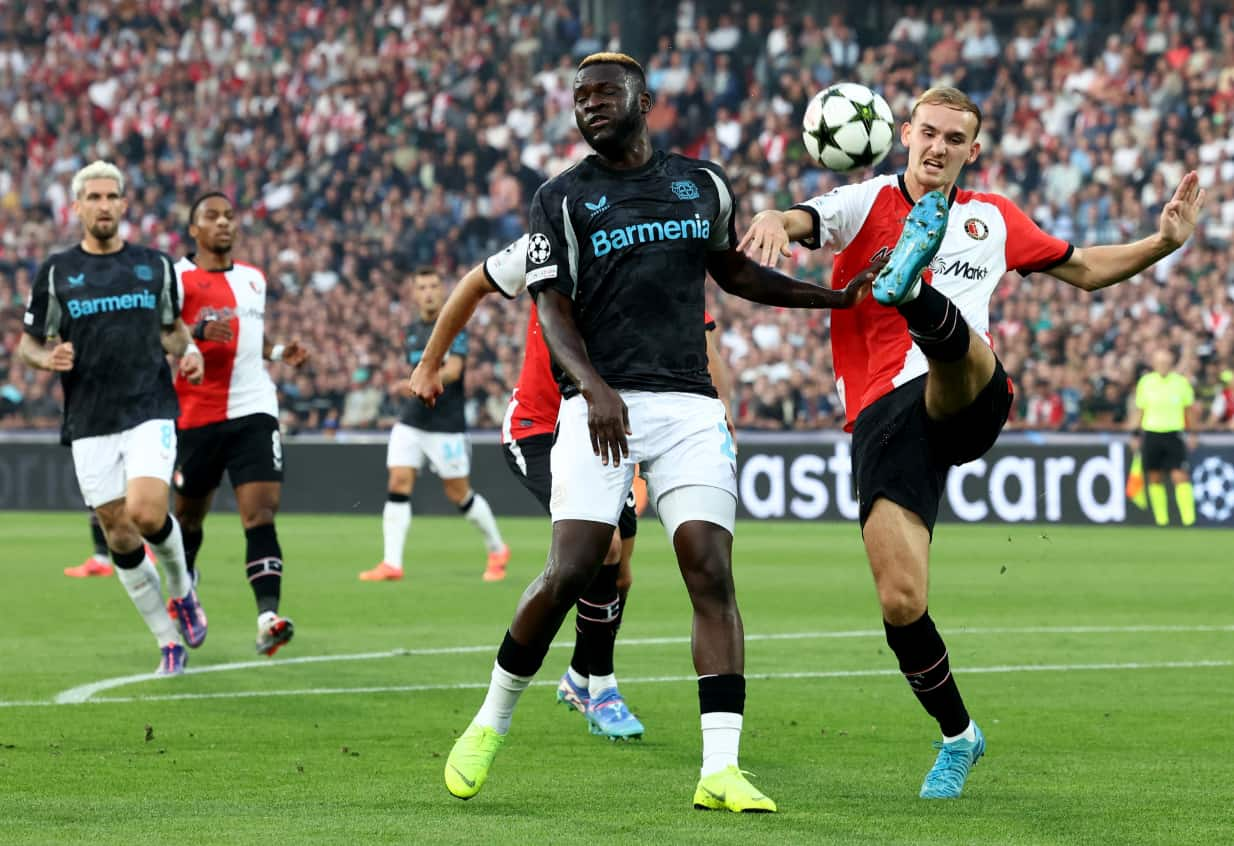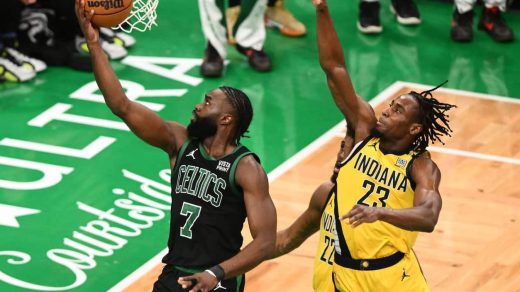In a defining Champions League encounter on September 18, 2024, the storied De Kuip stadium in Rotterdam became the stage for an extraordinary tactical masterclass as Bayer 04 Leverkusen secured a commanding 4-0 victory over Feyenoord Rotterdam.
This match stands as a testament to modern football’s evolution, highlighting how strategic team selection and tactical execution can decisively influence outcomes at the highest level of European competition.
The game was particularly illuminated by the exceptional performance of German international Florian Wirtz, whose brilliant brace exemplified the technical prowess and tactical awareness that defined Leverkusen’s approach.
Feyenoord vs Bayer Leverkusen Lineups

Beyond individual brilliance, the match showcased a fascinating contrast between traditional Dutch football philosophy and contemporary German tactical innovation.
Feyenoord Rotterdam’s Tactical Framework
Starting Formation Analysis:
- Defensive Unit Structure:
- Goalkeeper: Wellenreuther
- Primary shot-stopping duties
- Distribution responsibilities
- Aerial command
- Defensive organization leadership
- Goalkeeper: Wellenreuther
- Defensive Line Configuration:
- Right Back: Lotomba
- Attacking support duties
- Defensive positioning
- Wide area coverage
- Pressing involvement
- Center Backs: Trauner and Beelen
- Partnership dynamics
- Build-up participation
- Aerial dominance
- Line coordination
- Left Back: Hancko
- Overlapping runs
- Defensive coverage
- Cross delivery
- Positional awareness
- Right Back: Lotomba
Midfield Organization:
- Central Control:
- Defensive Midfielder: Zerruki
- Positional screening
- Build-up initiation
- Pressing resistance
- Transitional coverage
- Box-to-Box: Hwang In-Beom
- Vertical movement
- Pressing triggers
- Link-up play
- Late runs
- Creative Hub: Timber
- Distribution control
- Final third entry
- Space manipulation
- Set-piece responsibility
- Defensive Midfielder: Zerruki
Forward Line Setup:
- Attacking Trident:
- Right Wing: Milambo
- Width provision
- Dribbling penetration
- Defensive tracking
- Inside movement
- Center Forward: Gimenez
- Target man duties
- Pressing initiation
- Hold-up play
- Goal threat
- Left Wing: Igor Paixao
- Creative freedom
- Cutting inside
- Combination play
- Counter-attack speed
- Right Wing: Milambo
Bayer Leverkusen’s Strategic Approach
Defensive Foundation:
- Goalkeeper System:
- Number 1: Hradecky
- Distribution excellence
- Sweeper-keeper role
- Command presence
- Communication hub
- Number 1: Hradecky
- Three-Man Defense:
- Right Center-Back: Tapsoba
- Build-up specialist
- Recovery pace
- Aerial presence
- Progressive passing
- Central Defender: Tah
- Defensive leadership
- Positional anchor
- Aerial dominance
- Tactical organization
- Left Center-Back: Hincapie
- Ball progression
- Covering speed
- Technical security
- Pressing support
- Right Center-Back: Tapsoba
Midfield Engine:
- Double Pivot:
- Deep-Lying Playmaker: Xhaka
- Tempo control
- Distribution range
- Tactical discipline
- Pressing resistance
- Ball-Winner: Andrich
- Defensive coverage
- Pressing intensity
- Transitional balance
- Second ball control
- Deep-Lying Playmaker: Xhaka
- Wing-Back System:
- Right Wing-Back: Frimpong
- Attacking width
- Defensive recovery
- Overlapping runs
- Cross delivery
- Left Wing-Back: Alex Grimaldo
- Offensive support
- Technical quality
- Set-piece threat
- Positional flexibility
- Right Wing-Back: Frimpong
Advanced Positions:
- Forward Configuration:
- Attacking Midfielder: Wirtz
- Creative freedom
- Space exploitation
- Final third impact
- Goal threat
- Wide Forward: Terrier
- Movement Variety
- Pressing initiation
- Combination play
- Channel running
- Center Forward: Boniface
- Target presence
- Link-up play
- Pressing focus
- Goal scoring
- Attacking Midfielder: Wirtz
Match Timeline and Key Events
First Half Dominance:
| Time | Event | Description | Tactical Impact |
|---|---|---|---|
| 5′ | Goal (0-1) | Wirtz opener | Set early tempo |
| 30′ | Goal (0-2) | Grimaldo strike | Tactical control |
| 36′ | Goal (0-3) | Wirtz second | Psychological advantage |
| 43′ | Yellow Card | Trauner foul | Defensive caution |
| 44′ | Own Goal (0-4) | Wellenreuther | Match decisive |
Second Half Management:
- Feyenoord Substitutions:
- 46′: Zerruki → Smal
- Tactical shift
- Formation adjustment
- Fresh energy
- Width addition
- 60′: Lotomba → Hadj Moussa
- Defensive refresh
- Attacking impetus
- System modification
- Energy injection
- 61′: Igor Paixao → Ueda
- Forward change
- Tactical variation
- Fresh legs
- Different profile
- 72′: Trauner → Mitchell
- Defensive reorganization
- System adaptation
- Experience management
- Energy management
- 74′: Milambo → Nadje
- Attack refresh
- Youth injection
- Tactical variation
- Future investment
- 46′: Zerruki → Smal
- Leverkusen Substitutions:
- 62′: Boniface → Schick
- Forward rotation
- Fresh presence
- System maintenance
- Energy management
- 72′: Terrier → Adli
- Tactical adjustment
- Control enhancement
- Fresh creativity
- System modification
- 72′: Wirtz → Aleix Garcia
- Game management
- Control focus
- Energy conservation
- Tactical solidarity
- 80′: Grimaldo → Belocian
- Defensive security
- System protection
- Energy management
- Result protection
- 81′: Xhaka → Palacios
- Midfield refresh
- Control maintenance
- Energy injection
- Tactical discipline
- 62′: Boniface → Schick
Statistical Analysis and Performance Metrics
Possession and Control:
| Metric | Feyenoord | Leverkusen |
|---|---|---|
| Possession | 42% | 58% |
| Pass Accuracy | 78% | 85% |
| Total Passes | 387 | 523 |
| Successful Passes | 302 | 445 |
Attacking Output:
- Shot Creation:
- Feyenoord:
- Total Shots: 7
- On Target: 3
- Expected Goals: 0.8
- Key Passes: 6
- Leverkusen:
- Total Shots: 12
- On Target: 8
- Expected Goals: 3.2
- Key Passes: 14
- Feyenoord:
Tactical Analysis and Insights
Pressing Structures:
- High Press Implementation:
- Trigger Moments
- Ball-side orientation
- Player positioning
- Space compression
- Recovery systems
- Counter-Press Organization
- Immediate reaction
- Space control
- Player Responsibilities
- Support movements
- Trigger Moments
Build-Up Patterns:
- Deep Progression:
- First Phase
- Goalkeeper involvement
- Center-back splitting
- Midfield positioning
- Forward movement
- Second Phase
- Midfield rotation
- Wide activation
- Forward connection
- Space creation
- First Phase
Frequently Asked Questions
What made Wirtz’s performance exceptional?
- Spatial awareness excellence
- Technical execution quality
- Tactical understanding
- Match-defining moments
How did early goals impact tactical approaches?
- Feyenoord’s forced adaptation
- Leverkusen’s control establishment
- Substitution timing influence
- Game rhythm changes
What were the key tactical differentiators?
- Pressing effectiveness variation
- Positional play quality
- Transition speed differences
- Chance conversion efficiency
How significant were the substitutions?
- Impact on game flow
- Energy management
- Tactical adaptation
- Result protection
What lessons can be learned from this match?
- Tactical preparation importance
- Individual quality impact
- System flexibility value
- Game management significance
Technical Development Points
Individual Skill Focus:
- Goalkeeper Development:
- Distribution improvement
- Command enhancement
- Communication refinement
- Decision-making progression
- Defensive Skills:
- Positioning excellence
- Recovery capabilities
- Build-up participation
- Tactical awareness
- Midfield Abilities:
- Press resistance
- Space recognition
- Technical security
- Tactical understanding
- Forward Movement:
- Running patterns
- Finishing variety
- Link-up play
- Pressing execution
Also Check:
- Afghanistan National Cricket Team Vs Ireland Cricket Team Timeline
- India National Cricket Team vs England Cricket Team Timeline
- Boston Celtics vs Pacers Match Player Stats
Conclusion:
The Champions League encounter between Feyenoord Rotterdam and Bayer Leverkusen is a masterclass in modern football execution.
The comprehensive 4-0 victory by Leverkusen illustrated the perfect blend of tactical sophistication, technical excellence, and strategic preparation.
This match highlighted several crucial aspects of elite-level football:
- The significance of systematic pressing
- The importance of tactical adaptability
- The impact of individual brilliance within team structure
- The crucial nature of game management
Wirtz’s outstanding performance, contributing two goals and consistently threatening the opposition, exemplified how individual quality can decisively influence high-stakes matches.
The tactical approach employed by Leverkusen, combining aggressive pressing with controlled possession and efficient chance conversion, provides a blueprint for success in modern European football.
For Feyenoord, despite the challenging result, the match offered valuable insights into tactical preparation, in-game adaptation, and the importance of maintaining defensive organization against elite opposition.
The experience gained from this encounter will undoubtedly contribute to their continued development in European competition.
This match will be remembered not just for its scoreline, but for the tactical insights it provided and the high-level execution of modern football principles.
It stands as a testament to the evolution of the game and the increasing importance of tactical sophistication in achieving success at the highest level of European football.
The outcome serves as both a celebration of Leverkusen’s excellence and a learning opportunity for Feyenoord, demonstrating how European nights continue to shape the tactical development of football at the highest level.
This comprehensive analysis provides valuable insights for coaches, players, and football enthusiasts alike, highlighting the multifaceted nature of success in modern football.



